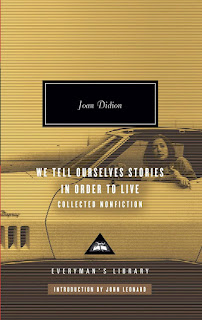One section is titled "On the Morning After the Sixties," named after a short essay near the end of the book. That would have been a less arch, more descriptive title for the whole book - but, even with my limited experience, I don't think Joan Didion was ever persuaded to do anything in a purely descriptive, reportorial way. This is a book about the curdled end of a particular kind of American Dream, about all the things Americans did and thought and cared about and worried about while, in the background, the Vietnam War lurched to its inevitable end and Nixon did the same.
Didion named it The White Album, after the long essay, more or less about rock music, that opens it. The book is less unified than its predecessor, Slouching Towards Bethlehem, and oddly more apocalyptic, both as the culture turned away from the obvious apocalypses and Didion's subject matter became more personal, more hermetic, and less general.
Slouching is a collection of semi-random essays, but one with a strong central point of view and set of concerns. White has the same point of view - Didion could not not be Didion - but the concerns are more personal, more an undercurrent of worry and uneasiness about what living in this world, or reporting on these things, has been doing to her. I'm probably reversing that, actually: I think Didion, at the time, would have said that she could report the way she did because of who she was, because of her worries and anxieties and dissociations.
It's divided into sections, the indication in an essay collection that there is no through-line, that what we have here are clusters. It opens with "The White Album," and we might realize, as readers, from that piece that Didion will circle her topics but not answer any of them, that the work of this decade (roughly 1968-1978) is all about questions and concerns raised and not addressed, all about things continuing to fall apart now that people have stopped paying attention to the rot and decay.
The other sections could be seen as a catalog of Didion's obsessions for that decade: California, women, travel, the fallout from "the Sixties." Most of the essays follow the model of "The White Album," with many of them having almost completely independent sections about different things that the reader is expected to connect together...or maybe not, since Didion seems to be despairing of any kind of connection, of anything or anyone.
I read The White Album in We Tell Ourselves Stories in Order to Live, a big omnibus of her non-fiction published nearly twenty years ago. (The omnibus title comes from the first line of "The White Album;" does that make it more appropriate?) I am no expert on Didion; I'm reading through her major nonfiction now, decades later and from very different starting points than she had in writing them. But White feels like a urgent note of some kind - suicide or ransom, something like that - from Didion to all of her peers, about her mental state that decade and the ways she thought she was...well, not characteristic of the time and world. Maybe canary-esque? Maybe she was saying "where I am now, you may all be eventually."
This is not as strong as Slouching. Very little is. But it's clearly the next step on that path, and there are lines in this book as true and searching as anyone has ever written.
I don't know how this will read for people a generation younger than me: I know, more or less, how Silents like Didion would take it, and Boomers, and Xers like me. But if this is history, if this is the dead past rather than part of your life, does any of it matter to you? If something was broken before you got there, is it just Ozymandias? Or does knowing about the breaking give you any more insight?
I don't know. We all have to decide that for ourselves. For me, this was valuable insights to a culture that permeated my childhood, that I noticed as much as a fish did water.

No comments:
Post a Comment